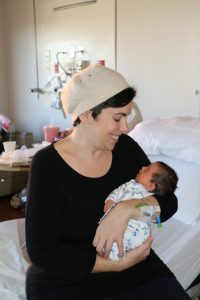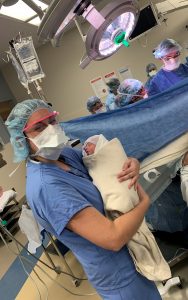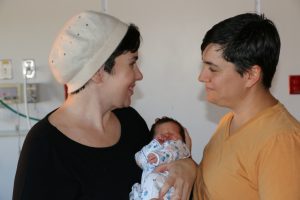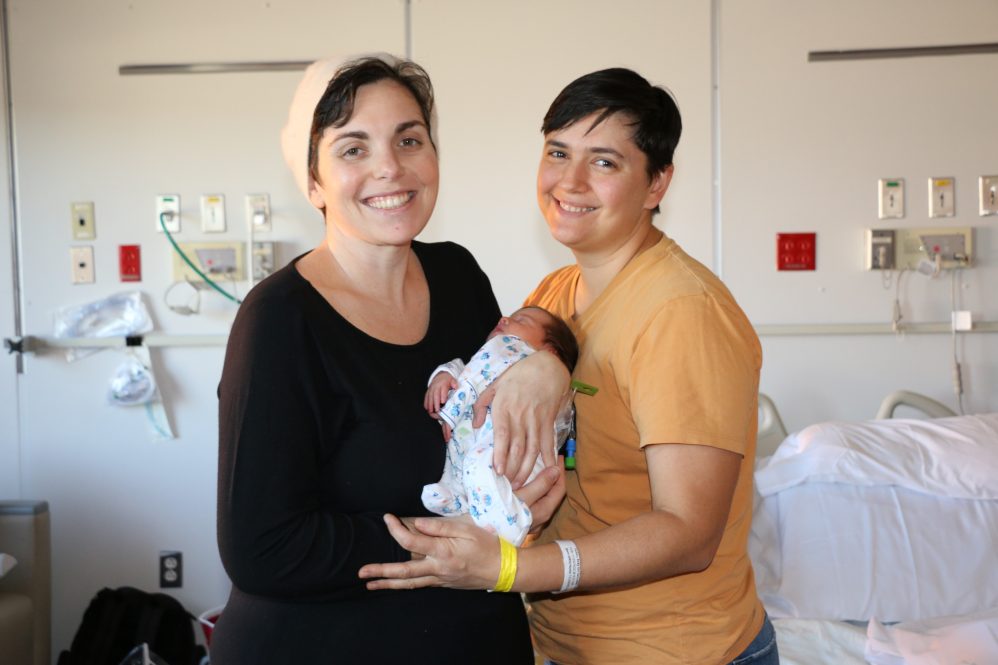
Sara Farber of Northampton, Mass., feels quite blessed this holiday season and truly lucky to be alive.
Shortly after meeting her brand-new baby daughter post-Cesarean section at UConn John Dempsey Hospital, Farber’s uterus started massively hemorrhaging blood, her blood stopped coagulating, and her blood pressure crashed. So much so that more than 13 units of red blood cells – more blood than an average human body even holds – was rushed and transfused to save her life in the OR where she was intubated and stabilized.
She survived.
Farber credits her survival and positive outcome to the advanced maternal-fetal medicine expertise, OB/GYN surgical care and planning, and skilled anesthesia care she received at UConn Health.
The UConn Health expertise and teamwork are why she will be celebrating Hanukkah this month with her newborn baby girl, 4-year-old daughter Libby Smigel, and wife, Esther Smigel.
“The quality of care I got at UConn Health is the reason why I am alive. If I wasn’t treated at UConn Health, I would have died,” Farber says, after experiencing both the new life of her second daughter and a near-death experience all on the same day – the Tuesday after Thanksgiving.
On November 29, Farber had a scheduled C-section to welcome her healthy daughter at 36 weeks with UConn Health’s newly recruited maternal-fetal medicine specialist Dr. Nicole Gavin who joined from Johns Hopkins. After doing extensive research, Farber chose to come specifically to Connecticut for Gavin’s maternal-fetal care expertise in the serious pregnancy condition called placenta accreta.

The family hails from New York City and moved to Northampton during the pandemic. They chose UConn Health over Boston and New York hospital options. Plus, Farber’s aunt Lina Godfrey, RN, happens to be the nurse manager for OB/GYN and Labor & Delivery at UConn Health.
Placenta accreta is when the placenta grows dangerously and deeply into the uterus, making a pregnancy higher risk for complications and maternal mortality due to the potential for excessive blood loss when the placenta doesn’t detach, or doesn’t fully detach, from the uterine wall during childbirth. Early diagnosis and careful care management is critical for the condition.
“A lot of women may not know that they have placenta accreta,” says Farber. “I was very lucky to find out early during an extra IVF-related pregnancy scan so I could take the necessary steps to find the best and most experienced medical team to care for me and my baby.”
For diagnosed patients like Farber, who was incidentally diagnosed with the serious condition at 22 weeks, special monitoring and care are required throughout the pregnancy, including a planned C-section to get the baby out safely. Also, the majority of pregnancies with placenta accreta lead to the immediate need for a hysterectomy to safely remove both the mother’s uterus and the abnormally attached placenta.
Thanks to their family’s successful care at UConn Health, they looked forward to the start of Hanukkah on December 18, when they named their newest daughter following in the Jewish tradition of having a baby naming ceremony. The baby’s Hebrew given name is Eden Perle, and she will be called Eden Reed.
“Hanukkah is all about miracles and this is our miracle,” Farber and Smigel say. “It is perfect timing to share her name and celebrate her birth. Hanukkah is going to be extra special this year.”

Saving Farber’s life was a huge team effort by Dr. Molly Brewer, chair of the Department of OB/GYN, who performed her hysterectomy once it was safe to do so; Gavin, of maternal-fetal medicine; a fleet of nurses like Farber’s aunt; many anesthesiologists; and many others.
“My aunt Lina Godfrey is an amazing nurse, a leader, and simply impressive. So was our nurse Jacki Pond, along with Karen Curley. I remember Karen saying to me ‘hold my hand, I’m here’ and the incredible anesthesia team, including nurse anesthetist Molly Mcgrath, who made sure I stayed calm and felt no pain at all, along with phenomenal anesthesiologists Dr. Amir Tulchinsky, Dr. Thomas Yasuda, and Dr. Joseph Gerace.”
Farber and her wife are also thankful to all the generous people who donate blood to save lives.
“We are really grateful to all who choose to give blood. The large amount of blood donation I received was the best gift that ever could have happened on my baby’s birthday. Without it, I would have died,” says Farber.
Farber’s wife recalls receiving the good news update from the UConn Health OR team after things initially looked dire.
“We were told simply ‘we’re winning!’ and it did feel like a miraculous win,” says Smigel.

“UConn Health is home to really excellent doctors, surgeons, nurses, and residents working together to make great plans and decisions. I am immensely grateful for the skill and expertise of Drs. Brewer and Gavin for leading and managing my delivery,” Farber says.
“Placenta accreta is a life-threatening illness that can have devastating consequences,” Gavin says. “I am so thankful to work with the outstanding team at UConn Health and to save this patient’s life.”
Just four days after giving birth and her life being saved, Farber was happily discharged home from UConn John Dempsey Hospital with her second bundle of joy and second chance at life.
Personally, she was very touched by all the medical care team members involved in saving her life making time to stop in to visit her during her hospital stay.
“The personalized patient experience and quality of care I received at UConn Health is really amazing. You don’t feel like just another number here,” says Farber.

“Thank you, UConn Health!”
Farber’s aunt, who happens to be the nurse manager of UConn Health Labor and Delivery/OB, also couldn’t be prouder to be part of the team at UConn Health.
“It was amazing and inspirational to see all members of each team come together,” Godfrey says. “Each team member visited Sara during her recovery showing such commitment, compassion and heart!”
Happy Hanukkah!
This holiday season Sara and Esther ask the public to consider making a gift to donate to help other high-risk pregnant mothers via UConn Health’s Maternal Fetal Medicine Fund.



